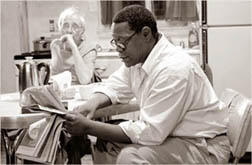|
observer |
|
|
|
|
|
OTHER LINKS |

|

|

|
ReviewsTheatre:'The sunset limited'
At first glance, "The Sunset Limited," one of Cormac McCarthy's unfortunately rare forays into theater, appears to be a departure for this eminent writer, since it takes place in a cramped Manhattan tenement, a far cry from the sweeping outdoor vistas he portrays in books like "All the Pretty Horses" or "The Crossing." Mr. McCarthy's intimate urban environment can be seen as his way to adapt to the strictures of the stage, but his terse dialogue and thematic obsessions (religion, violence, family) will be familiar to his readers. So will his thin plotting and pitch-black existential outlook. The seductively written "Sunset Limited" is like his previous work, only distilled into a philosophical debate. It begins soon after an African-American ex-convict named Black (Freeman Coffey) has stopped a Caucasian professor, White (Austin Pendleton), from throwing himself in front of a subway train. Black takes White back to his apartment, where he starts singing the praises of the Bible. White, an atheist, says the afterlife is just a pack of lies, and life is a futile joke. The only thing to do about it, he argues, is to commit suicide. Staged without fuss by Sheldon Patinkin, the play, which had its world premiere this year at the Steppenwolf Theater in Chicago, is essentially an argument about the old question "To be or not to be?" Black begins in control, but it quickly becomes clear that the nonbeliever is much more secure in his convictions than the believer. And when White goes on the attack, his nihilism steamrolls his opponent. "I yearn for the darkness," he says. "I pray for death. Real Death. If I thought that in death I would meet the people I've known in life I don't know what I'd do. That would be the ultimate horror." Loss of faithMr. Pendleton, an always intelligent performer, sits with concave posture, the bags under his eyes seeming to sink into his cheeks. He speaks his provocative lines with a jarring absence of desperation. White confesses to having found hope once in the world of culture, but no longer. What led to this loss of faith? He never says. Some in the audience may be frustrated by this omission - especially since this play provides very little action - but there is an abstract power in the mysteriousness of Mr. McCarthy's vision's allowing for a multitude of interpretations. Is Black a guardian angel or just a sinner looking for redemption? Was White really saved, or is he stuck in a kind of purgatory? But it's best to view the characters as something other than real people in a piece of naturalism. They're closer to something from Samuel Beckett The same goes for the father and son in Mr. McCarthy's most recent novel, "The Road," a frightening post-apocalyptic vision in which, as in this play, the living envy the dead. "The one thing I won't give up is giving up," White says toward the end of the play, his language elevating and his curt sentences expanding into more elaborate musings. This is no mere argument anymore. It's a poem in celebration of death. |









